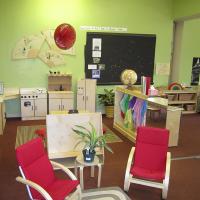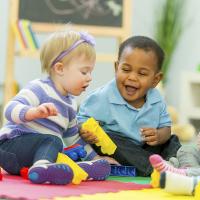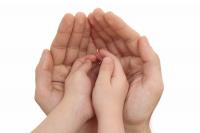Infants & Toddlers
The Infant & Toddler track is intended for early childhood professionals serving children ages 6 weeks through 3 years in center based programs. This track offers training and professional development resources, including written narrative, video, skill building activities, and classroom tools. The Infant & Toddler track consists of courses that mirror the core Child Development Associate (CDA) competencies plus a course on preventing child abuse and one on recognizing and reporting child abuse.
This course will teach you how to protect children from harm. You will learn about indoor and outdoor supervision, indoor and outdoor environments, safe sleep practices, child abuse, emergency preparation, and how to respond to injury.
Healthy environments are critical for infant and toddler development. In this course you will learn how to create and maintain healthy environments for all infants and toddlers, and how to implement hygiene practices to prevent disease. You will learn strategies to ensure safe toileting and diapering, daily health checks, as well as strategies to support children’s and families’ mental health needs. The importance of healthy nutrition and physical activity will also be addressed.
Infants and toddlers thrive in responsive, interesting learning environments. In this course, you will learn how to create developmentally appropriate indoor and outdoor learning environments and how to select and use materials to engage infants and toddlers in the world around them. You will also learn how to create responsive schedules and routines to nurture infants and toddlers.
The first three years of life are an important time of physical growth and development. In this course you will learn about the physical development of infants and toddlers, developmental milestones, and how to plan environments and experiences that support motor skills. You will also learn ways to take care of yourself physically so you can provide the best possible care to infants and toddlers.
This course will provide a basic understanding of infants’ and toddlers’ cognitive development. You will learn about supporting brain development, developmental milestones, the importance of relationships, engaging learning materials, and using research to support infants’ and toddlers’ learning and development.
Communication skills are vital to the overall development of infants and toddlers. In this course you will learn about communication milestones and what to do if you have concerns about a child’s development. You will also learn strategies to maintain effective communication with families and how to create a communication and language-rich environment.
Infants and toddlers are naturally curious about the world around them. In this course you will learn how important creativity is in your work as an infant and toddler caregiver. You will learn how to plan experiences and activities that support children’s curiosity, as well as how to select materials that nurture creativity. This course will also address how to promote creativity in your workplace.
As a responsive, nurturing caregiver you have the opportunity to positively influence infants’ and toddlers’ sense of self. In this course you will learn about how young children develop a sense of self and the importance of resilience in your work as a caregiver. You will also learn about the influence of culture and ways to support infants’ and toddlers’ sense of self through experiences, activities, and the environment. Stress reduction techniques and adult self-awareness will also be addressed.
Social-emotional skills are essential in the healthy development of infants and toddlers. In this course you will learn about social-emotional milestones and what to do if you have a concern about a child’s social-emotional development. This course will also address the impact high-quality environments have on social-emotional development, as well as the role you play as a responsive, nurturing caregiver.
Positive guidance impacts the social-emotional development of infants and toddlers. In this course you will learn how to use positive guidance techniques, as well as how temperament can impact behavior. You will also learn strategies for addressing challenging behaviors and how the environment can influence positive guidance. Creating interesting experiences and activities, as well as using relationship-based guidance approaches will also be addressed.
Family members are the most important people in young children’s lives. In this course you will learn how family-centered practice, strong family engagement, and positive, effective communication all contribute to high-quality early childhood practice. You will also learn effective strategies for working with and strengthening families of children with special needs, military families, and families facing other challenges.
In this course you will learn about how your roles and responsibilities as a direct care staff member contribute to the quality and organization of your program. Working collaboratively with your colleagues, planning and implementing developmentally appropriate experiences, and aligning curriculum with assessment will also be addressed. You will learn how to use evaluation data to improve program outcomes for children and families and how to be a reflective staff member
In this course you will learn about what it means to be a professional staff member. Traits of professional staff members, ethical practices that reflect professionalism, and the importance of professionalism when working with children and families will be addressed. You will learn how to nurture your own sense of professionalism and the importance of self-care in your practice.
Approximately 600,000 U.S. children are victims of child abuse or neglect each year. As an infant-toddler caregiver, you are obligated to recognize, report, and prevent abuse and neglect. This course will help you recognize, report, and prevent child abuse that occurs in the home, in your program, and in other settings. You will learn about your legal and ethical obligation to report suspicions of child abuse and neglect, procedures for making a report, and important steps you can take to build resilience in yourself as well as in children and families.
Your first responsibility as a child development professional is to keep children safe from harm. In this course, you will learn four important strategies for preventing child abuse and neglect. These include developing realistic expectations for infants’ and toddlers’ behavior, nurturing meaningful relationships with infants and toddlers, responding appropriately to challenging behavior, and ensuring the safety of your program space.
















